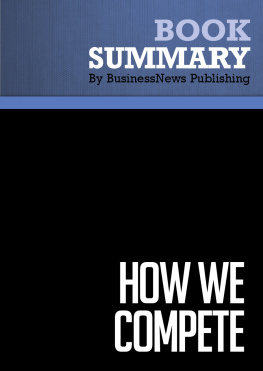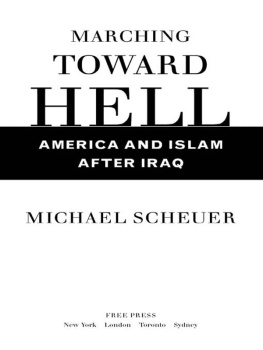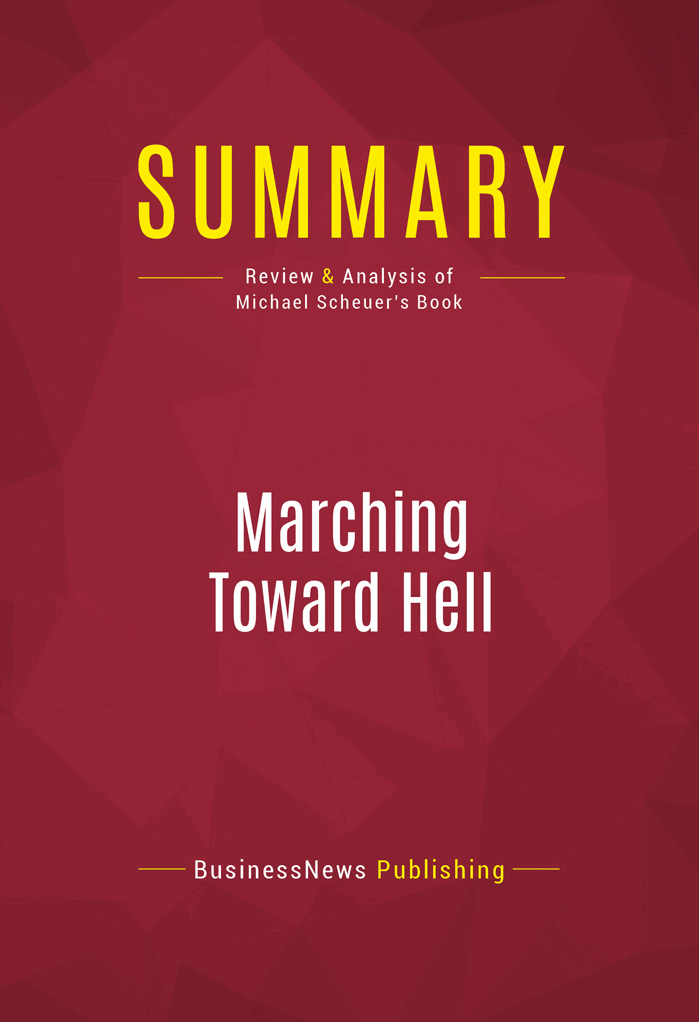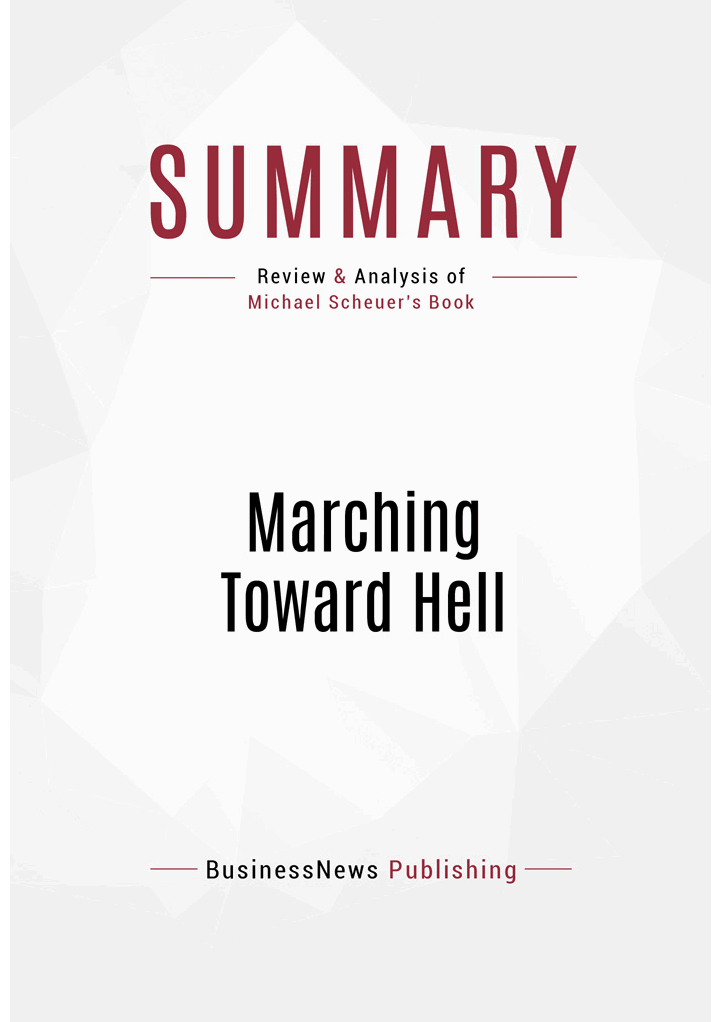Marching Toward Hell does not simply lay the blame for the failed Iraq war at the feet of the Bush administration. Rather, the author shows how Americas foreign policy since the end of the Cold War has undermined American security and made it possible for terrorists like Osama bin Laden to launch devastating attacks on our country.
The bipartisan governing elite of the United States has dictated American foreign policy looking at the world as they want it to be, rather than at how it actually is. The negative events that have unfolded since 9/11 and the March 2003 invasion of Iraq were foreseeable and Scheuer examines the causes of these events and offers ways to alter the destructive path America is currently on.
Michael Scheuer worked in the CIA for more than 20 years. From 1996 to 1999, he served as Chief of the Osama bin Laden unit at the Counterterrorism Center. He currently works as an Adjunct Professor of Security Studies at Georgetown University and writes regularly for the online Global Terrorism Analysis and is also the author of Imperial Hubris .
Summary of Marching Toward Hell (Michael Scheuer)
America and the Muslim World: 1973-1996
It has become a clich to say that the world changed forever on September 11, 2001, but history rarely pivots on a single day and 9/11 is no different. Our countrys current problems could have been foreseen had the governing elite studied history and recognized that their faith in American exceptionalism does not equate to America being exempt from the lessons, warnings, and wisdom acquired by studying history.
In 1973, the U.S. faced two major challenges in the Middle East, both of which have had a lasting impact on our foreign policy:
- The U.S. stepped in and gave Israel unlimited financial support and military equipment in the Yom Kippur War against Israels Arab foes. This inauguration and domestication of the U.S.-Israeli relationship is puzzling if viewed in light of what Israel offers America. It is devoid of resources useful to the U.S., un-defendable against a united foe, and counterproductive to the national-security interests of the U.S.
The U.S.s unquestioning support of what Israel does puts us squarely in the enemy camp in the view of more than 1 billion Muslims around the world. Israel does not, nor does any nation, have a right to exist, a common cry by supporters of the Israeli state, and the U.S. ignores its own well being by unquestioningly allying itself with this small country.
- The same year, Saudi king Faisal instated an oil embargo to damage the U.S. economy (because of Nixons support for Israel against its Arab enemies). Had Americas governing elite given over to common sense, this embargo should have spurred the U.S. to start a massive federal government-led financial and brainpower investment in domestic oil and gas deposits, alternative energy sources, the design and manufacture of more efficient automobile engines, and the development and proliferation of safer nuclear-power plants.
Instead, here we are 35 years later with the same energy dependence on the very nations whose leaders can simply slap a tariff on oil to cripple our economy.
These two decisions (tying ourselves to Israel and neglecting the opportunity to pursue energy solutions independent of the Middle East) ran directly counter to the goal of keeping open the greatest number of options for our government to respond quickly and with flexibility to unexpected events.
Then, beginning in 1982, came the era of non-decisions, when the U.S. government and its major allies stood by and watched as paramilitary training camps proliferated throughout the world. Lebanese Hezbollah was formed that year and diverse Islamic groups received training at camps in places like Afghanistan, Iran, Iraq, Kashmir, Somalia, Sudan, and Syria.
From the 1980s through 2001, Western governments did not make a serious and systematic attempt to destroy these camps that were churning out Islamic terrorists. There were harsh words, but no real action.
Members of the American and European governing elite constantly refer to the nuances of international politics that make it difficult to take definitive military or covert action against these camps. [This] ballet of international politics negates the work of members of the U.S. Intelligence Community, who repeatedly do the fieldwork to bring the information back to decision makers.
In 1989, the era of Western nation-building opened in earnest. The Soviets withdrew from Afghanistan and the West rushed in to teach the Afghanis how to build a democracy. The well-intentioned men and women who went in never had a chance and in the end did a great deal more harm than good for U.S. interests. Their attempts to build a secular democracy were viewed as an affront to God.
Instead of backing out and leaving the Afghanis to find their own political equilibrium, we helped to foster a national environment of intertribal strife, crime, narcotics trafficking, and ethnic animosity that have made a perfect home for al-Qaeda.
In 1990 and 1991, Washington marched U.S. forces onto the Arabian Peninsula with no intention of leaving. The U.S.-led war against Iraq won us nothing and showed our enemies that we would speak loudly, but then back off and leave the opposing army left to stand and fight another day.
In 1993, the U.S. pulled another punch when Saddam ordered an assassination attempt of former President George H. W. Bush. President Clinton, in retaliation, ordered a feeble cruise-missile strike against Saddams intelligence headquarters in the middle of the night. The lesson drawn by al-Qaeda was that that U.S. response to an attack was liable to be wordy but weak. Long before 9/11, Islamists had figured out that the U.S. is a super-talker rhetorically but a super-diddler militarily.
Fighting Islamists with a Cold War Hangover: 1996-2001
The Cold War is over, but the Cold War mindset is still alive and well in Washington. Cold War leftovers are plaguing U.S. foreign policy, obstructing the true nature of our enemies and what we must do to defeat them. Some of these leftovers include:
- Sense of time : The Cold War environment, though periodically high stress, was mostly calm, civil and unhurried. Decisions did not need to be made quickly. Between the collapse of the USSR in 1991 and 9/11, Presidents George H. W. Bush and Clinton spoke lovingly of the New World Order and globalization even as the U.S. military was embarrassed in Somalia, the World Trade Center was nearly destroyed, two U.S. military facilities in Saudi Arabia were attacked, Osama bin Laden declared war on America, and a billion-dollar Navy destroyer was nearly sunk in Yemen. We dont have the leisure of making decisions at a Cold War era pace. Our political leaders must learn to decide quickly, on less-than-perfect intelligence to protect Americans.
- Antinational Organizations : The Cold War gave birth to a myriad of political humanitarian organizations that are founded on the belief that the world is getting better, becoming more unified, and that the need for nation-states is diminishing. These groups (such as Amnesty International, Greenpeace, and the National Organization for Women) are unable to perceive reality. Instead, they try to administer international laws in order to trump national governments and believe that all the bad guys (except for the U.S. government) are gone. Today, any movements by the U.S. military are closely followed by any number of Nongovernmental organizations (NGOs). Though many do good work, they have no place on the battlefield. United States government leaders continue to be cowed by well-intentioned members of these NGOs, which make it impossible to act swiftly and decisively on Americas behalf.







